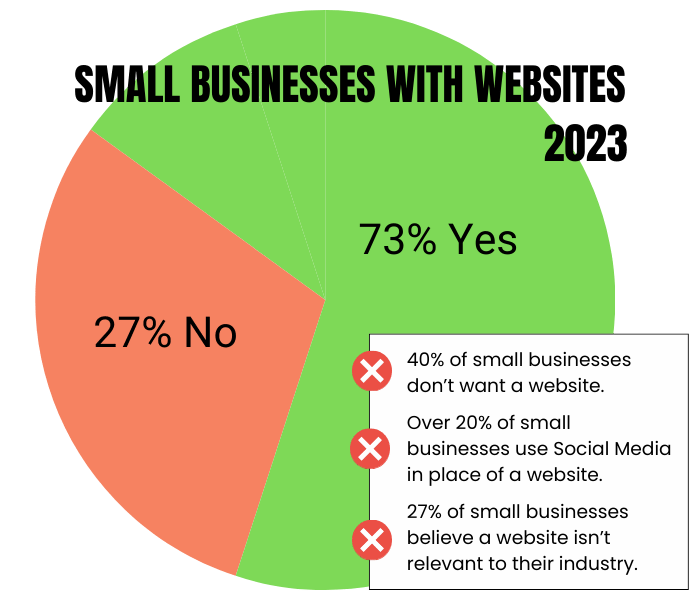10 benefits of a website for small business


Table of Contents
INTRODUCTION
The benefits of a website for small businesses are huge. Today, most people go online first to find information, products, or services. Without a website, your business may miss out on many potential customers.
A website helps small businesses sell products online, reaching more customers and making sales 24/7. Surprisingly, 27% of small businesses still don’t have a website, missing out on valuable opportunities in search results.

Source: Zippia
This blog shows why a website is a must for small businesses. It builds trust, runs 24/7, reaches more customers, and offers affordable marketing.
Whether you’re starting out or want to grow, know these benefits. They can help you succeed.
Why Some Small Businesses Don’t Have a Website?
Cost Concerns
Many small business owners worry about the cost of a website. Even with affordable options starting at $10 to $50 a month, some still think it’s too expensive or unnecessary. They believe their business can do fine without one.
Relying on Other Methods
Some small businesses rely on social media and word-of-mouth to get customers. These owners may feel their social media pages are enough and don’t see the need for a website.
Happy with Current Size
Some business owners are happy with their current size and don’t want to grow. They believe a website isn’t necessary since they’re not trying to attract new customers.
Technical Challenges
Building and managing a website can feel overwhelming, especially for those not tech-savvy. Many small business owners are already busy and don’t want to spend time learning how to manage a website.
Thinking It’s Not Needed
Some small business owners believe their niche market doesn’t need a website, especially with little competition. They think a website won’t add much value or provide the benefits typically seen for small businesses.
Worrying About Negative Feedback
Some owners fear a website could invite negative reviews or criticism, hurting their reputation. This concern often stops them from creating a site where customers can leave feedback.
Below are the 10 benefits of a website for small business:
1.Increased Online Presence

A website is like a digital storefront that anyone can visit from anywhere in the world. As of 2024, there are approximately 5.35 billion people using the internet, which represents about 66.2% of the world’s population. (source: datareport.com)
With billions of people using the internet and search engines, having a website helps your business be seen by more potential customers. Think of it this way: with just a physical store, only passersby see you. But with a website, anyone searching online for what you offer can easily find you.
This means that more people can discover your business, learn about what you offer, and make purchases or contact you directly through your website.
2.Always Available
The benefit of a website is that it’s always open, even when your physical store is closed. Imagine your customers wanting to browse your products or learn about your services at night or on weekends when you’re not around.
A significant 97% of consumers use the internet to find local businesses, so having your website available 24/7 means you’re always there when potential customers are searching for what you offer. This ensures you never miss a sale or a chance to connect with potential customers, no matter the time of day.
3.Professional Credibility

Having a well-designed professional website makes your business look more professional and trustworthy. Potential customers who visit your site and see that it’s neat, organized, and informative, are more likely to believe that you’re serious about your business.
It gives you a space to show off your skills and knowledge, which build trust. When people see that you’ve put effort into creating a great website, they’re likely to choose your business over others that might not seem as reliable.
4.Generating Leads and Sales
On average, about 5% of website visitors convert into leads, depending on the website’s optimization and the quality of traffic it attracts. This means that for every 2,000 visitors, a well-optimized site could generate 100 leads. (source: startupvoyager)
A well-optimized website with proper search engine optimization works like a 24/7 salesperson.
It guides them to take action, whether it’s filling out a contact form, signing up for your newsletter, or making a purchase. Your site can turn casual browsers into loyal customers.
“Calls to action,” encourages people to take the next step with your business. If someone is interested in your product, a simple “Buy Now” button on your website can lead to a sale.
Use your website to collect email addresses for future marketing and build a list of potential customers. These features turn your website into a powerful tool for generating leads and driving increased sales, helping your business grow.
5.Cost-Effective Marketing

A website is a great way to market your products and services without spending too much money. Unlike traditional marketing, like printing brochures or catalogs, which can be expensive, a website allows you to keep your content updated easily and at a lower cost.
You can connect to social media, helping more people find your business online. This integration makes it easier to reach a wider audience affordably.
Blog posts are an affordable way to boost your website’s visibility and engage with customers. Share useful content, to improve your search rankings and build credibility in your industry. Each post increases your chances of being discovered online, helping attract more potential customers.
When you think about the benefits for small business, cost-effective marketing is one of the most important. It’ keep your business visible and relevant to your customers.
6.Collecting Customer Insights
Collecting customer insights through a website is like gaining a clear view of what your customers want. Tools like Google Analytics help track their interactions, showing which pages they visit, what products they view, and how long they stay on your site. (read – 7 Google Analytics integrations to improve and optimize your product)
If visitors spend time on a product page but don’t purchase, update the product description or adjust the price to improve the customer experience and boost sales.
Use your website to gather data and better understand your customers. This insight lets you make smarter decisions based on real behavior, leading to happier customers and a more successful business.
7.Building Brand Awareness

When you regularly share your brand’s values, products, and services on your website, it helps people remember who you are and what you offer. This is called Brand Awareness.
Maintaining a strong web presence is crucial for building brand awareness. A website that regularly highlights your values and offerings helps potential customers recognize and trust your business. The more consistent your web presence, the easier it is for your brand to stand out and attract loyal customers.
This is crucial for businesses trying to stand out in a crowded market. A website that consistently highlights what your business offers helps potential customers easily recognize and trust your brand. This increased brand recognition can lead to more people choosing your products or services over others.
8.Connect with Online Customers
In 2024, the digital landscape shows that a vast majority of people are online—around 4.88 billion individuals globally own a smartphone, which accounts for about 85% of the total population. (source: Backlinko)
Smartphone use is big, with the average American adult spending over 3 hours and 45 minutes daily online. In 2023, mobile shopping made up 73% of all e-commerce, showing how much people rely on their phones for buying online.
Given these statistics, optimize your website for both mobile and desktop users. Ensure customers can easily find and interact with your business online, no matter what device they use.
9.Share Your Business Journey

Every small business has its own unique story and sharing that story on your website helps you connect with customers on a personal level. For example, maybe your business started as a passion project in your garage or was inspired by a personal experience that motivated you to help others.
Sharing your story shows the heart behind your business, making it relatable and trustworthy. Adding a “Company History” section to your website highlights your unique journey, building a stronger connection with customers. This personal touch can encourage them to support your business over larger companies.
10.Deliver Value to Your Customers
Creating value for customers means offering something that improves their lives. For small businesses, a website helps by providing key information like product details, prices, and helpful guides. It is easier for customers to make informed decisions.
It helps them make better decisions, increasing the likelihood that they’ll choose your business.
A website adds convenience by letting customers interact with your business anytime. Whether placing an order, asking a question, or learning more, they can do it on their schedule. This hassle-free experience is valued by customers, with 88% of them more likely to return after a positive website interaction.
Your website can engage and educate customers with blogs, videos, or tutorials. For example, if you sell gardening supplies, a blog on plant care helps customers while showing your business as an expert. It builds trust and keeps customers coming back for valuable tips and products.
Focus on creating value through your website to encourage customers to return and recommend your business.
BONUS TIPS
Tip1. Choosing the right web designer

Some small businesses avoid having a website due to bad experiences with a web designer.
They may have hired someone who overcharged or delivered a site that wasn’t high quality and didn’t meet their needs.
This frustration often leads them to give up on the process. A poorly designed website can damage confidence in the value of having an online presence, causing businesses to miss out on potential customers.
Conclusion
A website is essential for small businesses, offering more than just online visibility. It integrates marketing strategies, enhances customer service, and improves the overall user experience.
Over the long term, a well-optimized website allows you to make informed decisions through analytics and data, helping you tailor your services to better meet customer needs. By using your website strategically, you can build trust and create lasting customer relationships that drive growth and success.
Frequently Asked Questions
1. Why does my small business need a website?
A website is like your online store where people can learn about your business, see what you offer, and even buy from you. It helps you reach more customers, builds trust, and makes it easy for people to find you anytime they need something.
2. How much does it cost to create and keep a website?
The cost can vary, but you can start with as little as $10 to $50 per month. This usually covers hosting and domain fees. If you want more advanced features, it might cost more, but it’s worth it for the benefits your business gets.
3. Can’t I just use social media instead of a website?
Social media is great, but it’s not enough. A website gives you more control and lets you provide all the information customers need in one place. Plus, not everyone uses social media, so a website helps you reach even more people.
4. I’m not good with technology. Is it hard to build a website?
It doesn’t have to be hard. There are easy-to-use website builders that help you create a website without needing to know a lot about technology. Plus, you can always hire someone to help if you need it.
5. What if I get bad reviews on my website?
Negative feedback can be tough, but it’s also a chance to improve. When you address customer concerns on your website, it shows that you care about their experience and are willing to make things better.
6. How does a website help my business grow?
A website helps you reach more customers, stay open 24/7, and market your business in a cost-effective way. It also builds trust with customers and can turn visitors into paying customers, helping your business grow.
7. Can I sell products directly on my website?
Yes! You can set up an online store on your website where people can browse and buy your products anytime. It’s like having a store that never closes.
8. What if I only want to stay in a small business? Do I still need a website?
Even if you’re happy with the size of your business, a website can help keep your current customers happy and informed. It also makes sure new customers can find you when they’re looking for what you offer.
9. How does a website make my business look more professional?
A well-designed website shows that you’re serious about your business. It gives you a chance to show off your skills and knowledge, which helps build trust with customers.
10. How can a website help me learn more about my customers?
With tools like Google Analytics, you can see how customers interact with your website. You can learn what they’re interested in, what they like, and what you might need to improve, helping you make smarter business decisions.
